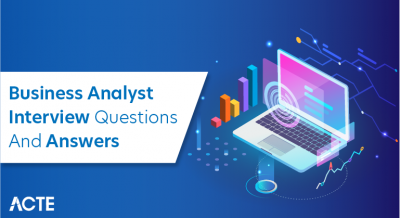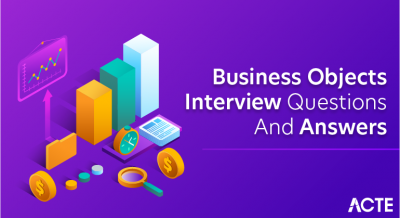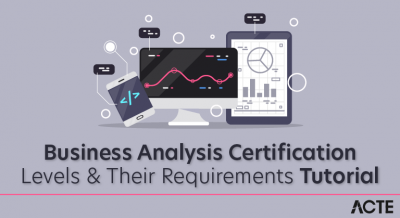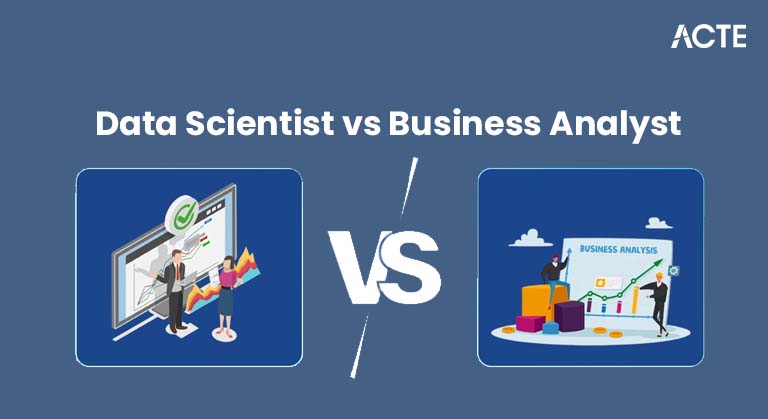
- Role Comparison: Business Analyst vs Data Scientist
- Educational Background: Business Analyst vs Data Scientist
- Skillset Differences in Business Analyst and Data Scientist Roles
- Tools and Technologies: BA vs DS
- Problem-Solving Approaches: BA vs DS
- Industry Applications of Business Analysts and Data Scientists
- Collaboration in Teams: BA vs DS
- Data Handling: Business Analyst vs Data Scientist
Role Comparison: Business Analyst vs Data Scientist
The roles of Business Analyst and Data Scientist differ significantly in their focus and skill sets, yet both play crucial roles in data-driven decision-making. A Business Analyst vs Data Scientist comparison highlights that Business Analysts typically concentrate on understanding business processes, gathering requirements, and translating data insights into actionable strategies. They use tools like Excel, Power BI, and SQL to analyze historical data and create reports — essential skills often emphasized in Business Analyst Training programs. In contrast, Data Scientists dive deeper into data, leveraging advanced statistical models, machine learning algorithms, and programming languages such as Python or R to extract patterns and predict future trends. Data science tools and technologies such as Hadoop, TensorFlow, and Tableau are commonly employed by Data Scientists for large-scale data analysis and visualization. While Business Analysts focus on providing actionable insights from existing data, Data Scientists go a step further by building predictive models and performing complex analyses. In the context of IOT in the Manufacturing Industry, both roles are becoming increasingly important. Business Analysts use IoT-generated data to assess production efficiency and identify areas for improvement, while Data Scientists leverage this data to build predictive models for maintenance, optimize supply chains, and enhance automation processes. Together, these roles complement each other, enabling organizations to harness the full potential of data in a rapidly evolving technological landscape.
Are You Interested in Learning More About Web Developer Certification? Sign Up For Our Business Analyst Online Training Today!
Educational Background: Business Analyst vs Data Scientist
- Business Analyst: Typically holds a degree in Business Administration, Finance, Management, or Information Systems, focusing on Data Handling and interpreting data for business insights. Business Analysts need to understand business processes and operations to guide decision-making.
- Data Scientist: Generally holds a degree in Computer Science, Statistics, or Mathematics, with a deep understanding of complex data analysis techniques. They focus on Problem-Solving Models, leveraging algorithms and programming to extract meaningful insights from large datasets often complementing their work with some of the Top Business Analysis Tools used in the industry.
- Problem-Solving Approaches: Business Analysts emphasize solving operational problems through process optimization and improving decision-making using business intelligence tools. Data Scientists, however, apply Problem-Solving Models using machine learning, predictive analytics, and data-driven techniques to solve more technical, algorithmic problems.
When it comes to the Educational Background of a Business Analyst vs Data Scientist, both roles require different sets of skills and knowledge. While both need a strong understanding of data handling, problem-solving approaches, and business acumen, their educational journeys often differ significantly. Here are six key points that highlight the differences in their educational backgrounds:
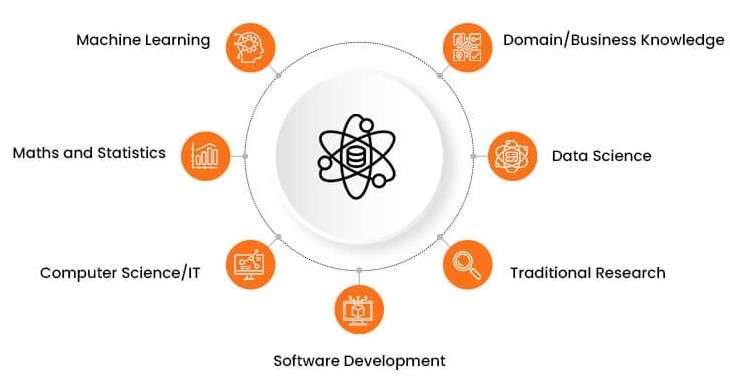
- Factory Automation & Robotics: While both roles intersect in industries like manufacturing, Business Analysts focus on improving operational efficiency through Factory Automation insights, whereas Data Scientists delve into Robotic Manufacturing and automation systems by developing intelligent models to predict machine failures or optimize production.
- Technical Tools: Business Analysts often work with tools like Excel, Power BI, and SQL to manage and visualize data. Data Scientists, however, utilize more specialized tools and languages such as Python, R, Hadoop, and TensorFlow to manipulate large datasets and build sophisticated predictive models.
- Data-Driven Strategy vs Technical Development: Business Analysts focus on interpreting data for strategic decision-making and process improvements, while Data Scientists use their expertise to develop technical solutions and advanced analytics frameworks that provide deeper insights into business problems.
- Business Intelligence Tools: Business Analysts commonly use tools like Power BI, Tableau, and Excel for data visualization and reporting. These tools allow them to create dashboards, generate insights, and present data in a way that’s easily digestible for business stakeholders.
- Statistical and Analytical Tools: Data Scientists rely on Data Science Tools and Technologies like Python, R, and Jupyter Notebooks to perform advanced statistical analysis and build predictive models. These tools enable them to work with complex datasets and develop algorithms for data-driven decision-making a process that increasingly overlaps with the Must Have Business Analyst Skills in Business, such as data interpretation, critical thinking, and effective communication.
- Data Management: While Business Analysts often use SQL and relational databases to query and manage data, Data Scientists typically leverage big data platforms like Hadoop and Spark to handle large-scale datasets from various sources.
- Machine Learning & AI: Data Scientists make extensive use of machine learning frameworks such as TensorFlow, Keras, and Scikit-Learn to build, train, and evaluate models for predictive analytics, whereas Business Analysts focus on interpreting data through descriptive and diagnostic analysis.
- IoT Integration: In the IOT in Manufacturing Industry, Business Analysts use IoT platforms like Power BI to visualize data collected from connected devices and sensors. In contrast, Data Scientists might analyze raw IoT data using tools like Apache Kafka to build real-time predictive models that help optimize factory operations.
- Collaboration and Reporting: Business Analysts use tools like SharePoint and Microsoft Teams for project management and collaboration. Data Scientists often rely on GitHub and Jupyter Notebooks for version control, code sharing, and collaborative development of data models.
- Manufacturing: Business Analysts streamline production workflows and identify inefficiencies, while Data Scientists use machine learning and sensor data to improve factory automation and enable robotic manufacturing through predictive maintenance.
- Healthcare: Business Analysts improve patient care delivery by analyzing service workflows and operational data often applying various Types of Business Analytics in Business, such as descriptive, diagnostic, and prescriptive analytics. Data Scientists develop predictive models for disease outbreaks, personalized medicine, and treatment optimization using large-scale health data.
- Finance: Business Analysts assess financial performance and support budgeting and forecasting. Data Scientists detect fraud, evaluate credit risks, and automate trading strategies using problem-solving models and real-time data analysis.
- Retail: Business Analysts focus on customer behavior analysis and inventory management. Data Scientists personalize shopping experiences and forecast demand using AI and data handling techniques.
- Logistics and Supply Chain: Business Analysts optimize delivery routes and vendor management, while Data Scientists enhance route planning and inventory forecasting using IoT and predictive analytics.
- Energy Sector: Business Analysts assist in regulatory compliance and process efficiency. Data Scientists use sensor and IoT data for energy load forecasting and grid optimization.
Skillset Differences in Business Analyst and Data Scientist Roles
The skillset differences in Business Analyst and Data Scientist roles reflect their distinct focuses and responsibilities. In a Business Analyst vs Data Scientist comparison, Business Analysts excel in interpreting business data, understanding operational processes, and translating complex data into actionable insights for strategic decision-making. They possess skills in data handling, using tools like Excel, SQL, Power BI, and Tableau to analyze historical data and generate reports. Data Scientists, on the other hand, have a strong foundation in programming, statistics, and machine learning, utilizing Data Science Tools and Technologies such as Python, R, TensorFlow, and Hadoop to build predictive models and perform advanced data analysis. Their work often complements the Top Applications Of Business Analytics In Business, driving data-informed strategies and innovation. Business Analysts focus on IOT in the Manufacturing Industry to optimize processes, identify trends, and improve efficiency, while Data Scientists leverage IoT data for more advanced tasks like developing algorithms to predict equipment failure or optimize supply chains. While Business Analysts work with descriptive analytics to provide business solutions, Data Scientists employ more technical and quantitative skills for predictive and prescriptive analytics. This divergence in skill sets highlights how both roles complement each other in driving data-driven decision-making within organizations, especially in industries that are increasingly adopting IoT and automation technologies.
Are You Preparing for Business Analyst Jobs? Check Out ACTE’s Business Analyst Interview Questions & Answers to Boost Your Preparation!
Tools and Technologies: BA vs DS
When comparing the tools and technologies used by Business Analysts (BAs) and Data Scientists (DSs), it’s clear that both roles rely on distinct sets of tools tailored to their specific responsibilities. While there is some overlap in the tools they use, Business Analyst vs Data Scientist roles require specialized technologies to meet their respective needs. Here are six key points to understand the tool differences:
Are You Considering Pursuing a Master’s Degree in Business Analyst? Enroll For Business Analyst Masters Program Training course Today!
Problem-Solving Approaches: BA vs DS
The Problem-Solving Approaches of Business Analysts (BAs) and Data Scientists (DSs) differ significantly, reflecting their distinct roles and objectives. A Business Analyst vs Data Scientist comparison shows that Business Analysts primarily focus on understanding business processes and translating data insights into strategic recommendations. Their problem-solving models often revolve around identifying inefficiencies and recommending process improvements or optimizations. They typically use historical data to provide actionable insights through descriptive analytics and visualizations, emphasizing data handling to organize, clean, and present information for decision-makers — core competencies developed through Business Analyst Training On the other hand, Data Scientists tackle problems by using advanced statistical techniques, machine learning algorithms, and predictive models to uncover patterns and forecast future trends. They leverage complex data-driven methods to solve problems such as optimizing factory automation and improving robotic manufacturing processes. Data Scientists apply problem-solving approaches that involve deep analysis and the development of algorithms that predict maintenance needs, enhance supply chain logistics, or improve operational efficiency. While Business Analysts are focused on delivering actionable insights through reporting and visualization, Data Scientists are more concerned with creating models that drive future innovation. Together, these approaches complement each other, enabling businesses to address both present challenges and anticipate future needs.
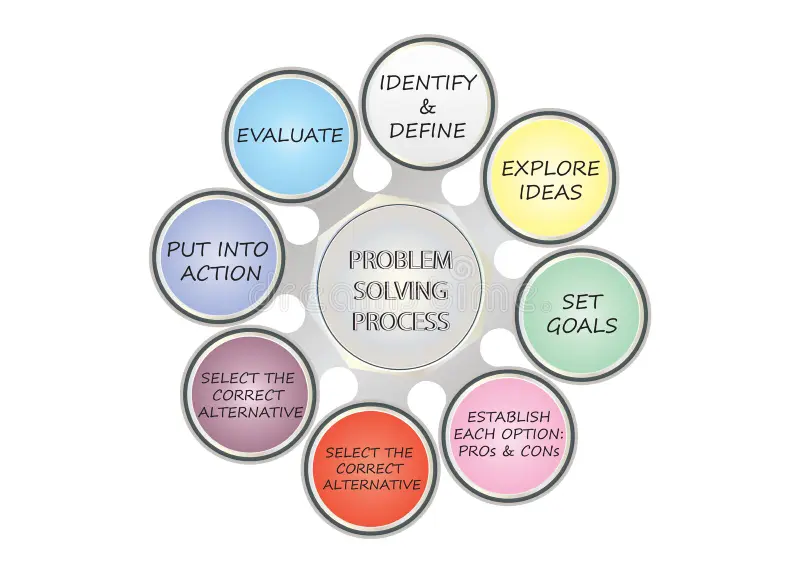
Industry Applications of Business Analysts and Data Scientists
Industry Applications of Business Analysts and Data Scientists span across multiple sectors, each contributing in unique ways to drive innovation, efficiency, and informed decision-making. While Business Analysts focus on optimizing business operations and aligning strategies, Data Scientists dive deep into data to build predictive models and automate processes. Together, they provide comprehensive insights across industries. Here are six key industry applications:
Collaboration in Teams: BA vs DS
Collaboration between Business Analysts (BAs) and Data Scientists (DSs) is essential in modern, data-driven organizations, especially when tackling complex projects that require both business insight and technical expertise. In a collaborative setting, BAs bring deep knowledge of business operations and stakeholder requirements, while DS professionals contribute advanced analytical skills and technical fluency. Business Analysts focus on defining the problem, gathering requirements, and ensuring solutions align with business goals. In the process, they often use visualization techniques to communicate insights clearly for example, learning how to Create a Donut Chart in Tableau can be an effective way to present categorical data in a visually appealing format. They play a key role in data handling, ensuring data is clean, relevant, and aligned with business objectives. Data Scientists, on the other hand, use this data to build problem-solving models that can predict outcomes or uncover hidden patterns. For example, in projects involving factory automation or robotic manufacturing, BAs may identify operational inefficiencies and recommend areas for automation, while DS experts develop algorithms and models to optimize machine performance or forecast maintenance needs. The success of such initiatives depends on aligned problem-solving approaches, where the BA ensures the solution addresses the business context and the DS ensures technical accuracy and scalability. Effective collaboration between these roles bridges the gap between strategy and execution, making it possible to deliver data-driven solutions that are both innovative and practical across industries.
Are You Interested in Learning More About Business Analyst? Sign Up For Our Business Analyst Online Training Today!
Data Handling: Business Analyst vs Data Scientist
Data Handling is a core responsibility for both Business Analysts and Data Scientists, but their approaches, tools, and objectives differ significantly. In a Business Analyst vs Data Scientist comparison, Business Analysts typically focus on collecting, cleaning, and organizing structured data from business systems like ERP or CRM tools to support reporting and strategic decision-making. They use tools such as Excel, SQL, and Power BI to generate dashboards and insights for stakeholders skills commonly taught in Business Analyst Training programs. Data Scientists, by contrast, handle much larger and more complex datasets, often unstructured or semi-structured, using advanced Data Science tools and technologies like Python, R, Hadoop, and Spark. Their goal is not just to describe data but to build predictive and prescriptive models through machine learning and statistical analysis. In the context of the IOT in Manufacturing Industry, Business Analysts use IoT data to monitor production performance and identify process inefficiencies, while Data Scientists dig deeper into sensor-generated data to forecast equipment failures, optimize machine usage, and enhance overall automation. While both roles require strong data handling skills, Business Analysts focus on business-driven insights, whereas Data Scientists are more focused on algorithmic development and data science modeling. Together, they ensure data is effectively transformed into valuable business outcomes.


